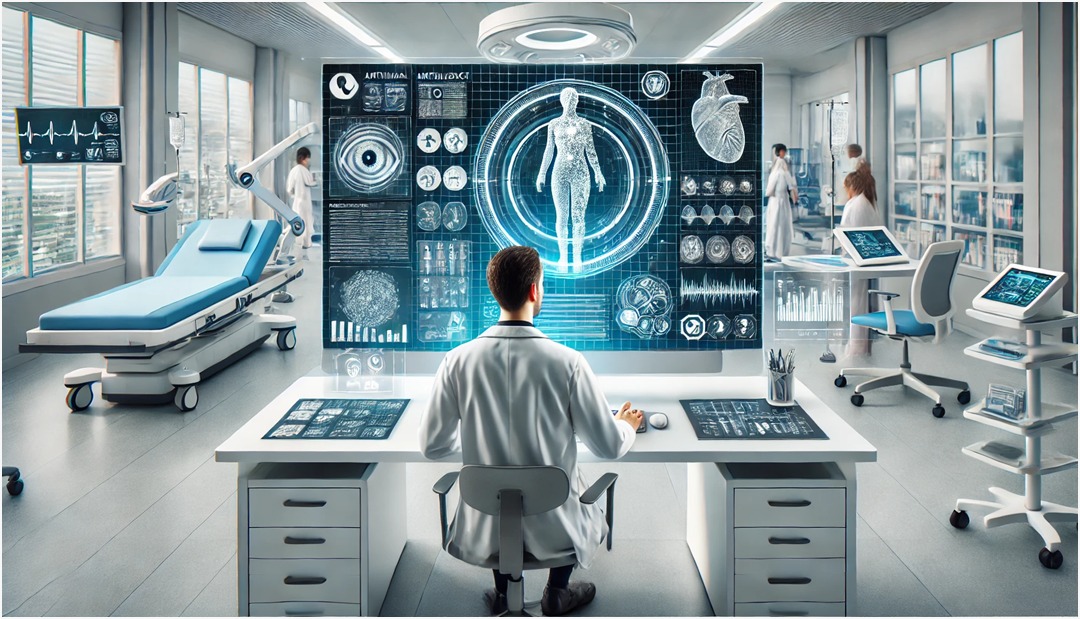The healthcare industry has seen significant advancements over the past few decades, and artificial intelligence (AI) has become a driving force behind these innovations. AI’s ability to process vast amounts of data, make predictions, and automate routine tasks is revolutionizing patient care, diagnosis, and treatment planning. This blog explores the transformative role of AI in healthcare, highlighting its benefits, challenges, and future potential.
The Power of AI in Diagnosis and Treatment
AI-powered tools are enabling healthcare providers to diagnose diseases more accurately and efficiently. Technologies like machine learning (ML) analyze medical images, such as X-rays, CT scans, and MRIs, to detect abnormalities that might be missed by the human eye.
Key Applications:
- Early Cancer Detection: AI algorithms like Google’s DeepMind have demonstrated the ability to identify breast cancer in mammograms with higher accuracy than radiologists.
- Personalized Medicine: AI models use genetic information and patient history to recommend tailored treatment plans, improving outcomes for chronic diseases such as diabetes and heart disease.
Streamlining Administrative Tasks
Healthcare professionals often spend a significant amount of time on administrative tasks. AI tools, such as natural language processing (NLP), can automate processes like:
- Medical Transcription: Speech-to-text algorithms efficiently transcribe doctor-patient conversations into electronic health records (EHRs).
- Appointment Scheduling: Chatbots handle patient inquiries, reducing the workload for administrative staff.
This automation saves time and allows healthcare workers to focus more on patient care.
Revolutionizing Drug Discovery
The traditional drug discovery process is expensive and time-consuming, often taking 10–15 years to bring a new drug to market. AI accelerates this process by:
- Identifying potential drug candidates.
- Predicting the efficacy of compounds.
- Optimizing clinical trial designs.
For example, IBM Watson Health has collaborated with pharmaceutical companies to discover potential treatments for diseases like Alzheimer’s and cancer.
AI in Patient Monitoring
Wearable devices equipped with AI algorithms are transforming the way patients manage their health. Devices such as smartwatches monitor vital signs like heart rate, blood pressure, and oxygen levels in real-time. AI analyzes this data to:
- Alert patients and doctors about potential health issues.
- Provide insights into lifestyle changes needed for better health.
- Improve chronic disease management.
Ethical and Practical Challenges
While AI holds immense potential, its integration into healthcare also brings challenges:
- Data Privacy: Handling sensitive medical data requires robust security measures to prevent breaches.
- Bias in Algorithms: AI models trained on biased datasets can lead to inaccurate predictions, impacting patient outcomes.
- Integration with Existing Systems: Implementing AI in healthcare infrastructure is costly and requires significant training for medical staff.
The Future of AI in Healthcare
As AI continues to evolve, its role in healthcare will expand further. Key trends to watch include:
- Telemedicine Integration: AI-driven chatbots and virtual assistants will enhance remote consultations.
- Robotic Surgery: Precision AI-guided robots will make surgeries safer and more efficient.
- Predictive Analytics: AI will analyze population health data to predict outbreaks and manage healthcare resources effectively.
Conclusion
Artificial intelligence is poised to revolutionize the healthcare industry. From early diagnosis and personalized treatment to automating administrative tasks, AI enhances efficiency and improves patient outcomes. However, addressing challenges such as data privacy and algorithm bias is crucial for its widespread adoption. As we look to the future, AI will undoubtedly play a central role in building a smarter, more efficient healthcare system.








